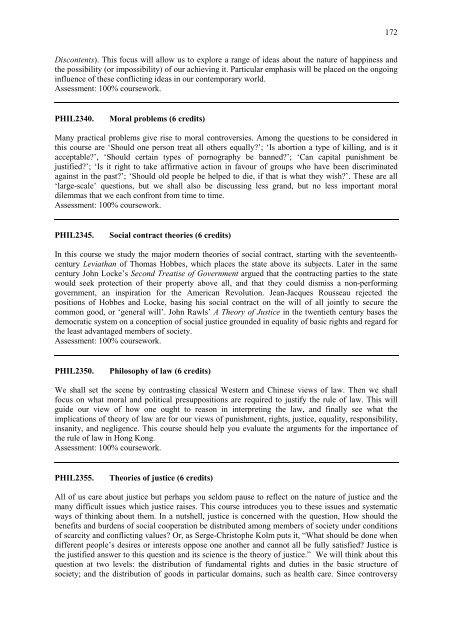(BA) (4-year-programme) - The University of Hong Kong
(BA) (4-year-programme) - The University of Hong Kong
(BA) (4-year-programme) - The University of Hong Kong
You also want an ePaper? Increase the reach of your titles
YUMPU automatically turns print PDFs into web optimized ePapers that Google loves.
172Discontents). This focus will allow us to explore a range <strong>of</strong> ideas about the nature <strong>of</strong> happiness andthe possibility (or impossibility) <strong>of</strong> our achieving it. Particular emphasis will be placed on the ongoinginfluence <strong>of</strong> these conflicting ideas in our contemporary world.Assessment: 100% coursework.PHIL2340.Moral problems (6 credits)Many practical problems give rise to moral controversies. Among the questions to be considered inthis course are ‘Should one person treat all others equally?’; ‘Is abortion a type <strong>of</strong> killing, and is itacceptable?’, ‘Should certain types <strong>of</strong> pornography be banned?’; ‘Can capital punishment bejustified?’; ‘Is it right to take affirmative action in favour <strong>of</strong> groups who have been discriminatedagainst in the past?’; ‘Should old people be helped to die, if that is what they wish?’. <strong>The</strong>se are all‘large-scale’ questions, but we shall also be discussing less grand, but no less important moraldilemmas that we each confront from time to time.Assessment: 100% coursework.PHIL2345.Social contract theories (6 credits)In this course we study the major modern theories <strong>of</strong> social contract, starting with the seventeenthcenturyLeviathan <strong>of</strong> Thomas Hobbes, which places the state above its subjects. Later in the samecentury John Locke’s Second Treatise <strong>of</strong> Government argued that the contracting parties to the statewould seek protection <strong>of</strong> their property above all, and that they could dismiss a non-performinggovernment, an inspiration for the American Revolution. Jean-Jacques Rousseau rejected thepositions <strong>of</strong> Hobbes and Locke, basing his social contract on the will <strong>of</strong> all jointly to secure thecommon good, or ‘general will’. John Rawls’ A <strong>The</strong>ory <strong>of</strong> Justice in the twentieth century bases thedemocratic system on a conception <strong>of</strong> social justice grounded in equality <strong>of</strong> basic rights and regard forthe least advantaged members <strong>of</strong> society.Assessment: 100% coursework.PHIL2350.Philosophy <strong>of</strong> law (6 credits)We shall set the scene by contrasting classical Western and Chinese views <strong>of</strong> law. <strong>The</strong>n we shallfocus on what moral and political presuppositions are required to justify the rule <strong>of</strong> law. This willguide our view <strong>of</strong> how one ought to reason in interpreting the law, and finally see what theimplications <strong>of</strong> theory <strong>of</strong> law are for our views <strong>of</strong> punishment, rights, justice, equality, responsibility,insanity, and negligence. This course should help you evaluate the arguments for the importance <strong>of</strong>the rule <strong>of</strong> law in <strong>Hong</strong> <strong>Kong</strong>.Assessment: 100% coursework.PHIL2355.<strong>The</strong>ories <strong>of</strong> justice (6 credits)All <strong>of</strong> us care about justice but perhaps you seldom pause to reflect on the nature <strong>of</strong> justice and themany difficult issues which justice raises. This course introduces you to these issues and systematicways <strong>of</strong> thinking about them. In a nutshell, justice is concerned with the question, How should thebenefits and burdens <strong>of</strong> social cooperation be distributed among members <strong>of</strong> society under conditions<strong>of</strong> scarcity and conflicting values? Or, as Serge-Christophe Kolm puts it, “What should be done whendifferent people’s desires or interests oppose one another and cannot all be fully satisfied? Justice isthe justified answer to this question and its science is the theory <strong>of</strong> justice.” We will think about thisquestion at two levels: the distribution <strong>of</strong> fundamental rights and duties in the basic structure <strong>of</strong>society; and the distribution <strong>of</strong> goods in particular domains, such as health care. Since controversy
















